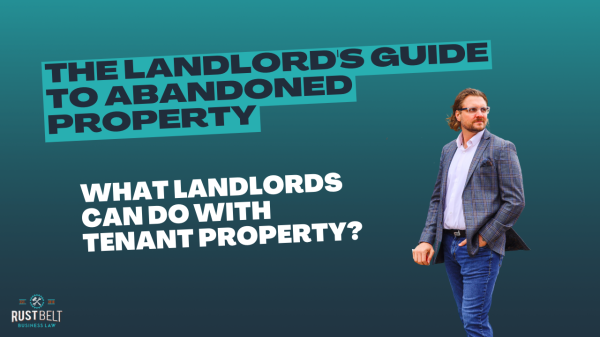We get a lot of calls from landlords wondering what they can do with a tenant's property. Sometimes the landlords have an Order for Possession. Other times the tenants have disappeared.
If you misappropriate a tenant's belongings, they will be able to sue you for the property's value, which could be a challenge for you regarding antique or sentimental items. You can be responsible for treble (triple) damages, attorney's fees, and court costs.
There are several scenarios that landlords need to understand when dealing with a tenant's property. Most of these rules come from 68 P.S. §250.505a, which we have summarized below.
Frequently Asked Questions
What can you do if the tenant abandons the property and gives the landlord notice?
- Notice of abandonment is the notice from the tenant to the landlord advising the landlord that the tenant is vacating the property.
- When property remains in the dwelling after the tenant leaves, the landlord must send notice to the tenant and any emergency contact the landlord has for the tenant with the following information:
- A phone number and address where the landlord can be reached
- The location where the property can be retrieved
- A statement that the tenant is liable for any costs associated with storage or removal of the property if the property is not retrieved within ten days of the notice.
- The notice must be personally delivered or sent by regular mail to the tenant's forwarding address or last known address. If the tenant listed an emergency contact on their lease, a copy of the notice should be sent to the emergency contact. The landlord is advised to use the USPS Certificate of Mailing to establish a postmark date.
- The tenant has ten days from the postmark to advise the landlord that they will pick up the property. If the tenant notifies the landlord of their intent to pick up the property within ten days, the landlord is required to hold the property reasonably for 30 days.
- The landlord may dispose of the property as they see fit if:
- Upon the 30-day waiting period expiration or if the tenant fails to pick up their property.
- The tenant fails to respond within 10-days from when the notice was mailed to them.
How can I store my tenant's property for 30 days?
The landlord may choose the location for storage, and the tenant is responsible for the reasonable costs. The landlord needs to exercise ordinary care in handling the tenant's property and make it reasonably available for retrieval.
What if you have an Order of Possession?
Once there has been an eviction judgment, and no appeal is filed, the landlord has the right to request an Order of Possession from the court. The Order of Possession gives the sheriff the right to evict the tenant from the property. REMEMBER Pennsylvania does not permit self-help by the landlord.
Does the tenant need to give notice of abandonment?
- Where the tenant vacates the property without communicating his intent to leave and leaves no forwarding address or emergency contact information, the landlord must wait ten days before disposing of the property.
- Be careful because the tenant is deemed to have abandoned if they vacated without communicating an intent to return and the rent is more than 15 days past due. The landlord posted notice of the tenant's rights regarding the property. However, if the tenant returns or says they have not abandoned, this will not apply.
Can I sell my client's property?
If the property is sold and the proceeds exceed the cost due to the landlord, the landlord must either send the proceeds via certified mail to the tenant or hold them for 30 days after the sale. Upon the expiration of the 30-day waiting period, the landlord may keep the proceeds from the sale.
What if my tenant has passed away?
Then this law doesn't apply. Landlords are directed to look to the Pennsylvania laws relating to decedents, estates, and fiduciaries, the contents of which are too complex for this article. An estate will need to be opened, and an administrator will need to be appointed to act on behalf of the estate.




